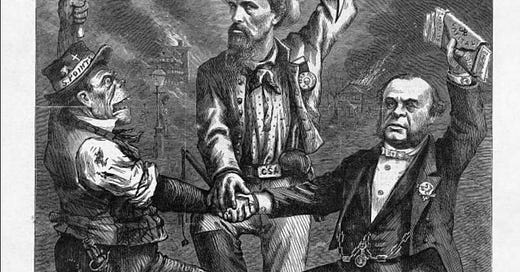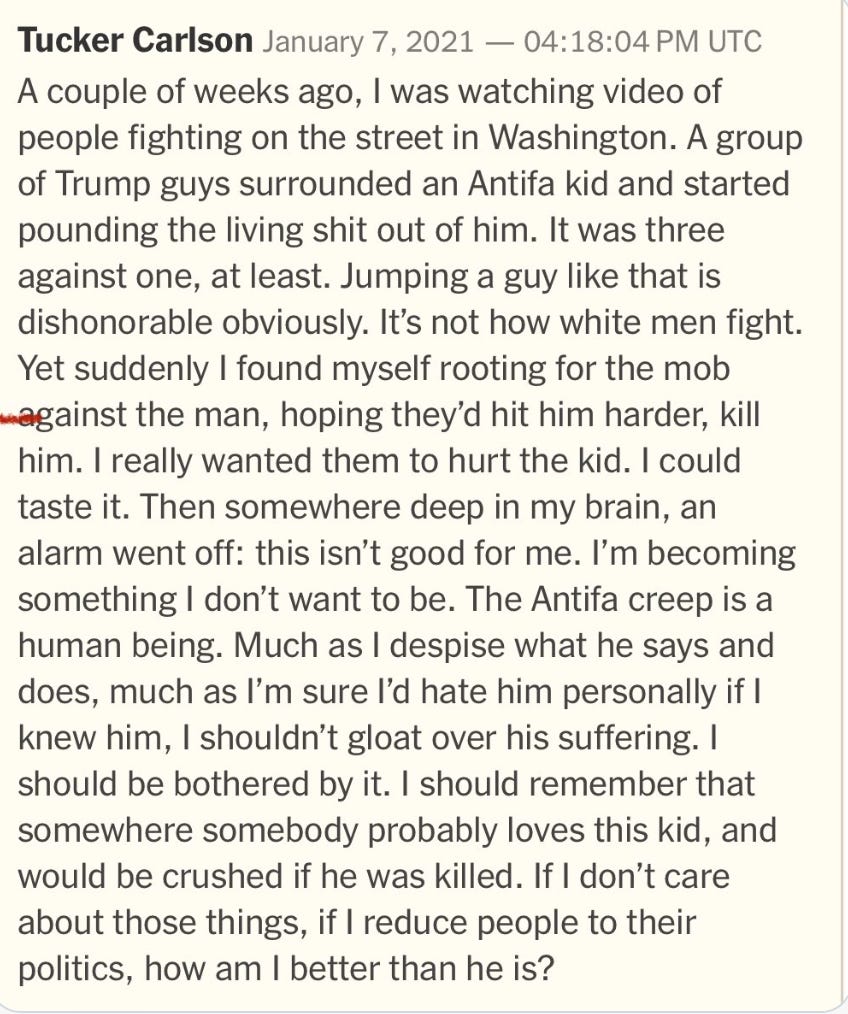Top notes:
I try not to do this too frequently (for the sake of your inboxes), but occasionally there’s something on my mind that I can’t shake unless I write about it. Thank you, sincerely, for humoring me here as I send an extra essay this week.
On Tuesday night, Fox leaked that one of the reasons why they fired Tucker Carlson was a set of text messages he sent his producer in January, 2021. That may or may not be true, but regardless, I haven’t been able to stop thinking about Tucker’s line— “it’s not how white men fight.” This essay is about that line.
As always, this is a reader supported space, so if this essay is useful to you, know that your help (subscriptions, shares, nice emails, etc.) makes a huge difference in this (slowly but surely) becoming a sustainable undertaking. Thanks!
How do White men fight?
All the time, obviously.
We get drunk and pick fights outside bars. We “what did you just say?” and “come at me, bro.” We stumble and swing and get held back and proclaim that the other guy is lucky that he didn’t get the full brunt of us.
We call the cops and they take care of it for us.
We become cops so that we can take care of it ourselves.
We shoot you when you ring our doorbell accidentally. We choke you when we can’t stand you being loud and agitated on the subway. We mow you down in a crowd when we’re feeling hopeless and unloved and you just happen to be in the wrong place at the wrong time.
We fight outside our house.
We fight and say that we’re protecting our house.
We save our ugliest fights for inside our house.
I’m not terribly interested in the fact that Tucker Carlson has a story he tells about how there’s a way that White men fight that is different from the (presumably sub-human) way that Black and Brown people fight. That’s a garden variety coping mechanism for those of us who find ourselves on top of cruel systems. We all know the drill: If we can persuasively tell a story about how we’re a member of a morally superior society (and a corresponding story about the less evolved brutes around us), then we get to keep the cognitive dissonance demons at bay.
Aristotle pulled that trick. He claimed that the Greeks had a right to conquer and enslave everybody to the North and South of them because of their enviable Mediterranean climate. Supposedly, that perfect weather transformed Aristotle’s countrymen into a smarter, more evolved, more innately righteous class of human beings. His was the Goldilocks school of race science: not too hot, not too cold, just right.
Thomas Jefferson pulled that trick. He wrote— cosplaying as an anthropological umpire who was just calling balls and strikes— that he had observed Black people around him and declared them less capable of advanced reasoning, creativity and imagination than White people. What good luck for our nation’s slave-owning third President that somehow, those were the exact qualities that he admired in himself.
The Declaration of Independence pulled that trick. It’s right there between the lines about men who are endowed by their creator with unalienable rights and the ones down below about the “merciless Indian savages.”
How do White men fight?
We pick fights and then say that you had it coming. The you in question might be a Black kid, it might be a woman who we feel disrespected us, it might be a queer or trans person who made us feel nervous about ourselves, it might be a country that has the bad fortune of being located over a strategic petroleum reserve. You all had it coming. Every time.
We fight and say that we are doing it to protect women, by which we mean White women.
We fight when somebody suggests that women (amongst many others) might need protection from us.
We fight and say we won’t do it again, that we’re not that kind of guy.
We make enough money to run for the state legislature and once there, the opportunities to fight (and to inflict pain) are virtually endless.
We fight from the pulpit.
We fight from the opinion pages of our nation’s paper of record.
We fight on cable news.
We fight from the federal bench.
We fight with highly skilled lawyers who know how to make the accusations go away.
We fight when Black and Brown people start getting too successful.
We fight when Black and Brown people make us feel guilty.
We fight when we don’t feel smart.
We fight when we believe that the rest of you aren’t acknowledging how smart we are.
We fight when we realize that— even for us— there might be limits as to what we can take, what spaces we can claim, and how far our voice can carry.
We fight when we realize we can’t all be President or CEO or a media mogul.
We fight when we do grab those brass rings but still can’t force the rest of you to love us.
Of course Tucker Carlson had a story about the innate hateability (and murderability) of a teenager with whom he politically disagreed. Of course he had a story about his own membership in a guilt-free class of noble gentlemen. We all tell ourselves those stories. For two years now, I’ve been working on a memoir about my own lifetime telling those stories— about how I tricked myself into thinking that my own guilt about Whiteness and maleness and the hurt that I’ve caused could disappear if I just distinguished myself enough from the Tucker Carlsons of the world.
It’s notable, though, that even a professional huckster like Carlson couldn’t pretend that White men aren’t a group “that fights.” Even he couldn’t deny that we are a violent lot that far too often both wishes and causes harm. Even he couldn’t deny that our desire to fight comes from deep-seated resentment, less so of the other, than what the other reveals about ourselves. All of that is right there in his stream-of-conscious text monologue. “I’m becoming something I don’t want to be” is just another way of saying “I’m doing a poor job of hiding the parts of myself I like to pretend aren’t there.”
Tucker Carlson, one of our nation’s all time great deniers and twisters of facts, couldn’t pretend that White men don’t fight all the time. Instead, all he could say is that if we do fight, we must do it the right way.
Tucker’s was a pathetic statement. It was a blubbering statement. It was the statement of somebody who doesn’t know how to live in a world that isn’t solely focused on his own comfort and ego gratification. And in that way— in spite of all of its readily critiquable lies— it is one of the most honest statements Tucker has ever made.
How do White men fight?
We fight because you all can’t take a joke.
We fight because we hurt each other and need to take it out on somebody else.
We fight with and about each other, all the better to pretend that we aren’t actually a “we,” and that some of us can be absolved of all of this.
We thank God for the White men among us who fight in more boarish ways. The MAGA guys. The Punisher-sticker-on-their-trucks guys. The guys who never learned that you’re supposed to say “not all men” when you’re in public.
We thank God for those guys because we don’t want to know what you’re all saying behind our back.
We (and by “we” I mean “I”) pretend we don’t fight because we’ve never raised a fist and because we have a shelf full of bell hooks books, but then, when we don’t get to be the boss at work, we get sullen and weird. Even worse, when we do get to be the boss at work, we make our continued insecurities a problem for the rest of you.
We fight all the things we don’t love (meaning: any voice but our own, anything that makes us self-conscious, anything that challenges our authority).
We fight whenever we fear that we might get found out.
We fight whenever we fear it might all slip away.
We fight whenever we don’t believe our own stories anymore.
We fight all the time.
We fight through tears.






This made me cry. I remember when I did The O'Reilly Factor and my inbox filled up with fighting White men and I told the producer, who seemed like a decent person, and he (a White man) said, "Oh, we don't condone that," as if he had nothing to do with it. I think White men fight so often as if it's all a big ass chess game. When really it is our souls at stake. And their souls at stake. And winning is so much less meaningful than so many other things.
Also, this line really got me: "Even he couldn’t deny that our desire to fight comes from deep-seated resentment, less so of the other, than what the other reveals about ourselves."
Thank you, Garrett. This is a necessary litany. Lately my mind has especially been on the kind of fight that arises from the feeling, I am about to not be loved. That paroxysm of fear at love’s possible loss, that deeper feeling of I never deserved the love I had in the first place.